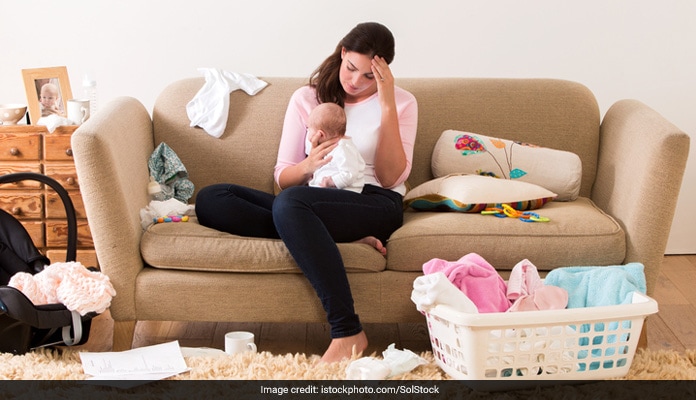Postpartum depression affects not only the woman but her infant as well as her entire family. Here's everything you need to know about this condition which affects women right after childbirth.

Postpartum depression: Mothers-to-be must definitely be aware of this condition
HIGHLIGHTS
- Progression of postnatal depression cannot be predicted
- Timely diagnosis an treatment is important for postpartum depression
- The condition can cause depression, anxiety and irritability
To be blessed with a child is a time for great joy and happiness, but it can be a time of an emotional roller coaster for a few mothers, thanks to postpartum depression. Postpartum depression is a condition in which moments of happiness after delivering a baby turn into moments of gloominess and makes the mother angry, sad and anxious. These "baby blues" occur naturally in the early days after delivery, and in most women, vanish quickly as they come. Sometimes, the symptoms may continue well past the first two weeks or they start developing over the next several months. Postpartum depression affects around 10 - 12% of women.
Postpartum depression and its causes
Postpartum depression is not yet fully understood. One of the reasons could be the abrupt fall of hormone levels after delivery, however not all women go through it. Women with pre-existing depression are 7 times more likely to suffer from postnatal depression. Poor family support, financial concerns, history of broken homes are all factors that will worsen the risk.
Also read: Fighting With Postpartum Depression? Some Sunlight Could Help!
Diagnosing postpartum depression
Unfolding and progression of postnatal depression is not at all predictable. In most patients, symptoms will go away without the treatment. However, about 20% of women will still face it in a year's time post delivery.
Postpartum depression affects not only the woman but her infant as well as her entire family. So, it is imperative to be diagnosed and treated in time. Common symptoms of postpartum depression are are sleep disturbances, anxiety, irritability, feeling overwhelmed, preoccupation with baby's health or feeding, etc. Some of these may be normal, however, it is the power of these symptoms and how they affect a woman's ability to adjust and deal with life stressors, that help identify the condition.
Also read: Here's An Effective Tip To Prevent Late-Life Depression You All Must Follow
Postpartum depression and sex
For most new moms, sex takes a back seat. Between adjusting with the new baby, its feeding schedules, the stress of being new parents, postpartum blues and depression, sex will always be the last thing on their mind. Postpartum loss of libido, hormonal and physical changes can bring a healthy sex life to a full stop. The loss of libido is more severe for most women than for men.
Decreased sexual urge is one of the most common symptoms that leads to depression. Most men who suffer from this say that they miss the intimacy with their wife. If postpartum depression and low libido are not addressed on time, they can have a detrimental effect on a couple's relationship.

Postpartum depression: Mothers-to-be must be aware of this condition
Photo Credit: iStock
Also read: How Stress In Early Life Can Lead To Depression Later
Once you identify what is happening, it is advisable to seek help at the earliest. Have an open conversation with your partner, meet a professional counsellor and consult your doctor on an immediate basis. Focus on rekindling intimacy with your partner and work on body image issues if those are weighing on your mind. If being intimate scares you initially, emphasize on re-establishing physical contact of non-sexual touch like just holding hands or a hug. This will help recreate the intimacy and bridge the gap between you and your partner by allowing you to share your personal space in a non-threatening way. Also, keep communication channels open and do not shut your partner out.
Remember, dealing with postpartum depression is definitely possible and it does not last forever. Educate yourself about the appropriate signs to look for, so that you can seek timely help.
(Dr. Anagha Karkhanis, Senior Gynaecologist, Infertility Specialist and Director of Cocoon Fertility)
Disclaimer: The opinions expressed within this article are the personal opinions of the author. NDTV is not responsible for the accuracy, completeness, suitability, or validity of any information on this article. All information is provided on an as-is basis. The information, facts or opinions appearing in the article do not reflect the views of NDTV and NDTV does not assume any responsibility or liability for the same.
DoctorNDTV is the one stop site for all your health needs providing the most credible health information, health news and tips with expert advice on healthy living, diet plans, informative videos etc. You can get the most relevant and accurate info you need about health problems like diabetes, cancer, pregnancy, HIV and AIDS, weight loss and many other lifestyle diseases. We have a panel of over 350 experts who help us develop content by giving their valuable inputs and bringing to us the latest in the world of healthcare.















